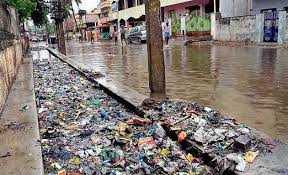Published
7 years agoon
By
Frimpong
It is the norm in some communities in the Ashanti region and I dare say the country at large that immediately it gets cloudy, gutters get stuffed with waste of all kinds to await the rain that is expected to carry them away.
It’s almost as if we enjoy sharing our homes with all kinds of flying and crawling insects, not to mention the very offensively choking smell that sometimes greet visitors at the entrance of our homes, all because we decide to ‘hoard’ our rubbish and wait for ‘miss rain’, the only generous rubbish collector who does so for free.
Waste collectors in these communities meanwhile charge from Ghc1 upwards, depending on the quantity of waste they collect from you. To be fair, some people cannot afford to pay for waste collection when they are struggling to feed on a three-square meal a day. That notwithstanding, there is no justification for willingly and deliberately choking our ‘poor’ gutters; especially when that single action comes with a lot of consequences than one may think of.
These choked gutters end up causing unnecessary floods which displace some people and sadly take the lives of others. In Aboabo, a community within the Asokore Mampong municipality of the Ashanti region, the infamous storm drain, popularly called “Paleele” has been wreaking havoc for years in that community which has now become an issue of national concern.

Dumping waste in gutters: ‘The rain will carry it away’ canker and it’s damning effects.
There have been numerous interventions by the government to manage the situation and several other failed attempts at nipping it in the bud. But how would there be success when the very people feeling the pinch the most are the same ones consciously contributing to the choked gutters.
Dredging of the Aboabo drain begun last year in a bid to address perennial floods caused by siltation after de-silting it severally yet to no avail.
A 14-member committee has been set up to monitor and ensure residents don’t dump refuse and defecate in the drain in the course of the dredging exercise, but what about those who sit at the comfort of their homes and fill gutters with all sorts of waste that end up in the big drain, who monitors them?
I unfortunately witnessed such a situation and I couldn’t stop myself from asking the perpetrator why that dastardly act was committed and guess the response I got: “I don’t see why should I pay money to the rubbish collector when the rain will carry it away for me when I put it in the gutter.”
So you see, we can do all the dredging in the world, set up all the committees we can, and talk all the talk we can about this menace, but without attitudinal change of the perpetrators who also happen to fall victims of the dire consequences of this ugly phenomenon of putting waste in gutters, we will end up pouring water in a basket.
We can only do so much, I will continue to do my small community evangelism about this canker, I can only hope you do yours as well, wherever you find yourself!
Suraya Alidu Malititi

























